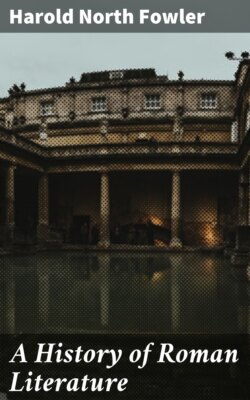Читать книгу A History of Roman Literature - Harold North Fowler - Страница 3
На сайте Литреса книга снята с продажи.
PREFACE
ОглавлениеTable of Contents
This book is intended primarily for use as a text-book in schools and colleges. I have therefore given more dates and more details about the lives of authors than are in themselves important, because dates are convenient aids to memory, as they enable the learner to connect his new knowledge with historical facts he may have learned before, while biographical details help to endow authors with something of concrete personality, to which the learner can attach what he learns of their literary and intellectual activity.
Extracts from Latin authors are given, with few exceptions, in English translation. I considered the advisability of giving them in Latin, but concluded that extracts in Latin would probably not be read by most young readers, and would therefore do less good than even imperfect translations. Moreover, the texts of the most important works are sure to be at hand in the schools, and books of selections, such as Cruttwell and Banton’s Specimens of Roman Literature, Tyrrell’s Anthology of Latin Poetry, and Gudeman’s Latin Literature of the Empire, are readily accessible. I am responsible for all translations not accredited to some other translator. In making my translations, I have employed blank verse to represent Latin hexameters; but the selections from the Æneid are given in Conington’s rhymed version, and in some other cases I have used translations of hexameters into metres other than blank verse.
In writing of the origin of Roman comedy, I have not mentioned the dramatic satura. Prof. George L. Hendrickson has pointed out (in the American Journal of Philology, vol. xv, pp. 1–30) that the dramatic satura never really existed, but was invented in Roman literary history because Aristotle, whose account of the origin of comedy was closely followed by the Roman writers, found the origin of Greek comedy in the satyr-drama.
The greater part of the book is naturally taken up with the extant literary works and their authors; but I have devoted some space to the lives and works of authors whose writings are lost. This I have done, not because I believe that the reader should burden his memory with useless details, but partly in order that this book may be of use as a book of reference, and partly because the mention of some of the lost works and their authors may impress upon the reader the fact that something is known of many writers whose works have survived, if at all, only in detached fragments. Not a few of these writers were important in their day, and exercised no little influence upon the progress of literature. Of the whole mass of Roman literary production only a small part—though fortunately in great measure the best part—now exists, and it is only by remembering how much has been lost that the modern reader can appreciate the continuity of Roman literature.
The literature of the third, fourth, and fifth centuries after Christ is treated less fully than that of the earlier times, but its importance to later European civilization has been so great that a summary treatment of it should be included even in a book of such limited scope as this.
The Bibliography will, I hope, be found useful. It is by no means exhaustive, but may serve as a guide to those who have not access to libraries. The purpose of the Chronological Table is not so much to serve as a finding-list of dates as to show at a glance what authors were living and working at any given time. In the Index the names of all Latin writers mentioned in the book are to be found, together with references to numerous topics and to some of the more important historical persons.
Besides the works of the Roman authors, I have consulted the general works mentioned in the Bibliography and numerous other books and special articles. I have made most use of Teuffel’s History of Roman Literature, Schanz’s Römische Litteraturgeschichte, and Mackail’s admirable Latin Literature.
My thanks are due to my colleague, Prof. Samuel Ball Platner, who read the book in manuscript and made many valuable suggestions, and to Professor Perrin, who read not only the manuscript, but also the proof, and suggested not a few desirable changes.
Harold N. Fowler.
Cleveland, Ohio.
